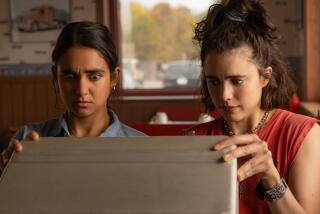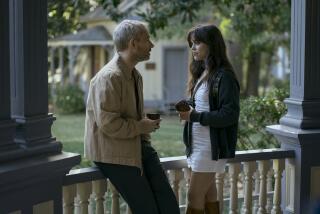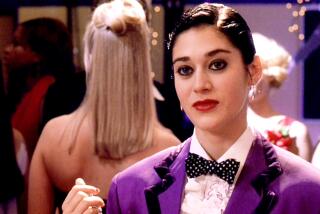Women who aren’t ‘likable’ still a tough sell in films
No matter what audiences conclude about “Gone Girl’s” lead character, Amy Dunne, the film’s star Rosamund Pike says that by the end of the movie, they shouldn’t be wondering about Amy’s authenticity. Although Pike agrees that Amy could be boiled down, simplistically, to “unlikable,” she chooses to interpret Amy’s personality in a different way.
“So many times, if [a female character is] not a nurturing, maternal type, she’s in some way less of a woman,” Pike says. “Amy makes mistakes, and you might not admire her, but she’s true to herself. We see a woman who’s been performing her whole life, and suddenly we see the truth.”
While the quest for complexity in female roles remains a constant, on-screen women who veer into objectionable territory with murky motives or questionable methods create reactions that go beyond a discussion of the quality of a performance. Despite having a well-established level of comfort with ruthless male characters, even savvy audiences can feel cold and disconnected when the gender tables are turned.
“We think of women as a safe haven in some ways. It’s something that goes very deep,” says screenwriter Diablo Cody. “And when that warmth isn’t there, it’s jarring.”
Cody knows this all too well, based on the negative reactions she heard to 2011’s “Young Adult,” the follow-up to her Oscar-winning screenplay, “Juno.” “Young Adult” was praised by critics, but Charlize Theron’s central character, Mavis, a self-absorbed writer who’s clinging to her high school days, was branded as resolutely unlikable.
The “U-word” has also been a part of discussions around some of this season’s films, notably Jason Reitman’s “Men, Women & Children,” in which Jennifer Garner, Judy Greer and Rosemarie DeWitt’s characters go to equally distasteful lengths to navigate relationships in their lives. Reitman says the discomfort in seeing women playing unpalatable roles might just come from not having seen as many stories about women on-screen.
“I’ve said this before: If you want to make original movies, make movies about women, because their stories have not been told as much,” he says. “It’s an interesting line between portraying individual women versus portraying women as a gender, and that’s certainly something that people are sensitive of. When I hear people argue about ‘Gone Girl,’ the conversation often boils down to, ‘Is this just one sociopath, or is this an interpretation of women?’ And we live in a sensitive time.”
Pike sees some of Amy’s outrageous actions as a result of deep-rooted anger, which makes her difficult personality difficult to resolve.
“We are in a culture that doesn’t really embrace female anger or allow an outlet for it without a woman seeming hysterical or shrill,” Pike says.
The unfavorable reaction to portraits with an abundance of gray area is mostly a film issue, in novelist and screenwriter Nick Hornby’s estimation.
“It’s not a problem in life, and it’s not a problem in books, but in films there’s been I don’t know how many years of reducing women to functional paths,” says Hornby, whose current project is the screenplay for “Wild,” starring Reese Witherspoon as a strong, self-reliant woman. “They’re pretty, and they are capable of pulling a guy out of some kind of slump, and that’s it. So when you see a woman who is actually a person, then it challenges audiences who are used to seeing something different. No one would ever give up on a novel because the central character was complicated.”
Hornby sees “unredeemable” as a bigger hurdle than “unlikable” for an audience’s acceptance of a character.
“It makes movies more palatable generally if one can offer some vestige of hope not solely for the character but for all of us,” he says. “If [‘Wild’ author] Cheryl Strayed hadn’t been redeemed, I wouldn’t have wanted to write it, and you probably wouldn’t have wanted to go and see it. But I’m not sure that’s a male/female thing necessarily.”
But for Cody, a lack of redemption is precisely what makes some of these characters seem so real.
“The redemption arc is really satisfying to people for some reason, but it isn’t real,” she says. “I don’t know that many people in real life who’ve had a redemption arc. You continue making the same mistakes.”
Though Theron failed to earn an Oscar nomination for her acclaimed performance, the Academy of Motion Picture Arts and Sciences has shown over the years that it has no issue with embracing less-than-savory personalities — even among women. With examples including Louise Fletcher (Nurse Ratched in 1975’s “One Flew Over the Cuckoo’s Nest”) and Kathy Bates (Annie in 1990’s “Misery”), the extremely unlikable can still be awardable. Cody says she was heartened to see Cate Blanchett win an Oscar for “Blue Jasmine” last season for playing someone who can only be characterized as horrible.
“She was awful, and that made me extremely happy. I feel like that character is kind of a spiritual cousin to Mavis in ‘Young Adult,’” Cody says.
More to Read
From the Oscars to the Emmys.
Get the Envelope newsletter for exclusive awards season coverage, behind-the-scenes stories from the Envelope podcast and columnist Glenn Whipp’s must-read analysis.
You may occasionally receive promotional content from the Los Angeles Times.






